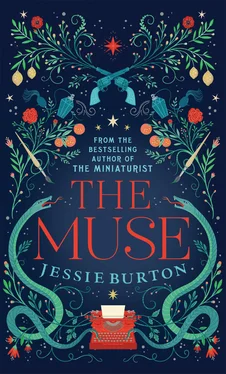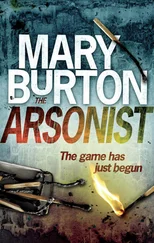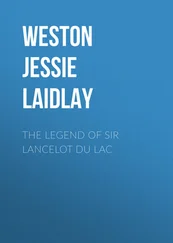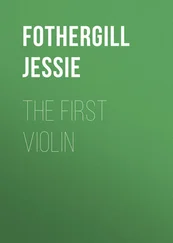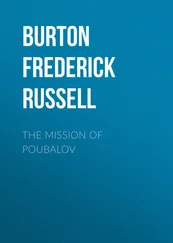‘Come and sleep here,’ she said to Teresa. Teresa, who’d been reading one of Olive’s books in the corner, put it down and obeyed, climbing onto the old mattress, lying rigidly next to Olive under the dusky pink coverlet, unable to move for fear that to do so might expel her from this magic kingdom.
They lay side by side, staring at the ceiling together as the atmosphere lightened in the room, the energy of Olive’s work and concentration dissipating into the air, until all that was left was the glowing green face of Isaac on the easel. Beyond the window, into the land, no rooster or dog or human cry broke their silence as they fell asleep, fully clothed.
*
Two days later, Olive decided to go with Teresa to Malaga, ‘to make a day of it,’ she said, ‘and why not?’
‘But how long are you going to be?’ asked Sarah. Teresa supposed she was agitated, because for the first time in months she was going to be alone.
‘We’re going to the shipping office for Mr Robles, and then I thought we’d have a lemonade in Calle Larios,’ said Olive.
‘Well, make sure you get that farmer fellow to bring you back before nightfall.’
‘I promise.’
‘He isn’t a red, is he?’
‘ Mother .’
The Orchard was a large painting, and it took both girls to carry it down the finca path, as if it was a stretcher missing a body. Teresa looked back up at the house and saw Sarah watching, staying at the window right until they were down in the valley and she disappeared from their sight. The mule man was waiting for them in the town square. Teresa tried to ignore the uneasy feeling in her gut when she imagined Sarah on her own. She couldn’t pinpoint the worry, so she focused instead on the pleasure of a day trip. She was in her best blue dress; she’d washed her hair and doused herself with the distilled orange blossom Rosa Morales, the doctor’s daughter, sold out of her kitchen. It could almost be feria time, for the sense of holiday Teresa felt.
As she sat with the wrapped parcel of The Orchard propped beside her, on the back of a mule cart thirty kilometres along the Malaga road, Teresa was surprised at how bulky the package was under the string and paper. She did not question it, simply because she was now deliciously in Olive’s good books again. She would do as she was bid. Olive’s hair was flying in the wind, and her white-framed sunglasses made her as glamorous as her mother. Why would you want to ruin such a blue-sky day?
The mule pulled along the white-dust road, and Olive pointed out more red ribbons that had been tied around the girths of the cork oaks. The vision was vaguely unsettling, like shining lines of blood fluttering in the breeze. ‘What are they?’ she asked in Spanish.
The mule driver turned over his shoulder and said, ‘They’re trouble.’
Teresa saw them as an omen for what violence might come to this land, as it had so many times in centuries before. No one ever saw who tied these ribbons — Adrián had been one of them, apparently — but the fact that there were people determined to adorn the trees suggested an undercurrent of defiance, a desire to turn things on their head. Teresa didn’t want anything turned on its head. She had only just managed to achieve this day.
Full of self-importance and happiness, they reached the shipping office and arranged with the mule man when and where he should come back to fetch them. They made the post office just before it closed for siesta, sending off the parcel for today’s shipment to France. The Orchar d was off to the Galerie Schloss on Paris’s Rue de la Paix.
Afterwards, they walked the wide boulevards, admiring the wrought-iron lamp posts adorned with hanging baskets, trailing petunias and geraniums in hot pinks and scarlets. They looked through shop windows, pointing out to each other the best-dressed of Malaga’s high society. They went inwards to the narrower, cobbled streets, all shutters closed against the midday heat. It was metropolitan, so different to their rural hideaway on the slopes of Arazuelo. Teresa was pleased to see how impressed Olive was with her native city. It might not be London, but it was by turns stately and timeless, as the sun beat down on the stone, or reflected off the polished vitrines and ornate wooden frames of department stores and pharmacists.
They walked down to the harbour and sat to enjoy a lemonade, wondering which of the enormous ships that pulled in and out with such constant frequency would be taking away their duplicitous cargo.
‘Isaac knew the painting would go,’ Olive said. ‘He just didn’t want to be the one who sent it. Do you think I’m being fair to him?’
‘What you mean to ask is — will my brother carry on doing this for ever.’
Olive looked at her in surprise. ‘Yes, I suppose I do.’
Teresa gazed out to sea. ‘The money will never be a good reason for him.’
She was telling the truth; it had never been enough for either of them. Even though he had kept some aside from the sale of Women in the Wheatfield , they had both always wanted things that money couldn’t buy; legitimacy, love. Teresa did think that Olive was being thoughtless, that her use of Isaac’s name as a front for her own work was not something he would continue to tolerate. As for herself, as long as Olive wanted it, she was happy to oblige.
Olive frowned. ‘That sounded like a threat.’
‘No, no,’ said Teresa. ‘But — he is a man, you know.’
‘What do you mean?’
Teresa couldn’t answer with the precision she wanted in English. And although she worried that Olive’s actions were bringing her closer to some undefined, simmering danger that was coming, which Teresa couldn’t name but could almost taste — she was so happy to be here, by the sea, the lemonade, that she didn’t want Olive’s thoughtlessness to stop.
‘My brother can speak for himself,’ she said obliquely, and Olive, not wishing to go any deeper into the sourer elements of this plot of theirs, turned away to look at the gigantic liners moving out to sea.
They returned to the finca at dusk, tired and happy. ‘Teresa,’ Olive said, as they reached the front door.
‘Yes?’
‘I won’t let anything happen to you. You can trust me, I promise.’
Teresa smiled, amazed to hear her own words being spoken back to her, the second half of the same spell. When they went inside, Sarah was nowhere to be seen.
‘Where is she?’ said Olive, and the panic in her voice was so childlike, so easily accessed.
‘She has probably gone out for a walk,’ Teresa said.
‘My mother doesn’t go for walks.’ Olive ran out into the orchard, and on the pretext of searching for Sarah in the upper rooms, Teresa took the opportunity to slip into the attic and confirm her suspicions. It was as she thought. The green-faced portrait of Isaac was nowhere to be seen. By now, it was deep in the bowels of a liner, on its way to Peggy Guggenheim.
Sarah began frequent walks out of the finca estate, an unprecedented gesture for someone usually more inclined to smoke on a sofa. She began to pull the ready vegetation from the rented land, piling it up in a wide wicker basket, the earth-encrusted roots still attached. She would announce her trip to the village to buy artichokes, and soon there was a molehill of them in the kitchen. The vases of wildflowers had multiplied so considerably that Teresa was running out of receptacles.
Ten days after their trip to Malaga, a telegram from Harold arrived. Teresa went down to pick it up, and ran all the way back to the finca, handing it to Olive, who was shelling peas with her mother at the kitchen table.
‘GREEN FACE GENIUS GOES TO GUG STOP ALSO BOUGHT MAGNIFICENT ORCHARD STOP BACK END OF WEEK STOP,’ Olive read aloud. ‘Peggy Guggenheim bought them both,’ she breathed. ‘Isaac will be pleased.’
Читать дальше
